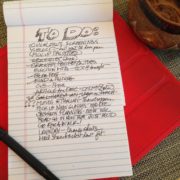People pleasing looks like saying “yes” to everything, or being the person who’s always there for anything that’s preferred or needed by the other person.
People pleasing stems from codependency dynamics. This is when we gain our sense of self through what other people think of us. We constantly allow others’ opinions to shape our moods. This translates to having poor, or no, boundaries, and neglecting our own needs in the process. Sometimes it has gone on for so long, you don’t even know what your own needs and desires are anymore. Those needs become buried beneath the anxiety of pleasing others.
At this point, when you have become truly codependent, you don’t even recognize what you need, want, or desire any longer. with your needs in the backseat, waaaay in the back, your mistaken goal is wanting to preserve the relationship via your (wrongheaded) attempts to please. The fear is that by not pleasing the other, you may either harm or sever the relationship completely. This is at the core of nearly all conflcit. And that frightens you.
Why Do Some Engage In People Pleasing?
Maybe you hold the belief that being a good person means always being available. Maybe somehow in your life, a parent or family member gave you this message through their own choices. It may have been modeled for you as a child in an environment that was not safe unless you tip-toed around everyone else, walking on eggshells, trying not to upset anyone. Alternatively, perhaps you hold the conviction that this is being selfless, influenced by religious or philosophical beliefs.
If this is true for you, you will notice that you often feel resentful, left out, or not included. After all, you’re doing or being what others think you should do or be. Your negative feelings stem from the fact that you are not actually pleasing anyone—you are attempting to control how people view you.
Your negative feelings stem from the fact that you are not actually pleasing anyone—you are attempting to control how people view you.
This exhausting mental state feels like an unending marathon you can never win. You likely feel guilty for weeks after saying no to a family outing or social event. Or even if you are simply needing some space. There’s so much fear and rumination associated when we don’t trust our ability, nay our right, to have our own limits.
Let me be clear. There is a difference between wanting to do something nice for a loved one or partner, and doing so out of a fear-based motivation. In healthy relationships it is natural to want to perform kind acts for another, but you don’t do this because you want to make certain they love you. You do it because there is existing reciprocity in the relationship, a natural give and take.
Check In On Your People Pleasing
Ask yourself: WHY am I doing this? Do I genuinely want to? Does this bring me joy as well as the other person? Am I attempting to control the way someone perceives me? Is my concern solely around what they think of me? *A caution is that if you make these choices because you fear either emotional or physical harm. In this case, the relationships may be abusive and/or dangerous. See resources below if this is the case.
Boundaries Are Beautiful And Healthy
Emotionally healthy people have clear boundaries. They understand that “No” is a complete sentence (thank you Anne Lamott). They get that being assertive isn’t bad, that it’s simply stating what you need, kindly and calmly, without trampling on the other person’s rights. People with clear boundaries allow for people to view them as they choose, without trying to control the process with their own behaviors and choices. And they do not take it personally when someone has a negative reaction to their clear choices. This is what the ongoing process of successful self differentiation looks like. This is a growth edge for most people!
Contact me here if you struggle with this. It takes practice, and I promise if you do the work—and I don’t deny it can be tough—you will feel and be respected, your self esteem will rise, and you will be more of who you truly are. And that, my friends, brings a great deal of peace.
Resource: RAINN the nation’s largest sexual assault hotline.











